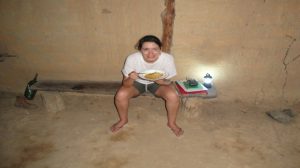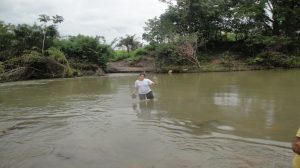[This blog post is part of a three-way interview between Kristoffer Friis Bøegh, Jeroen Willemsen and Ana Paulla Braga Mattos.]
Ana Paulla Braga Mattos is a PhD-researcher at Aarhus University. She conducted fieldwork on Kalunga, an Afro-Brazilian Portuguese variety spoken in the state of Goiás in Brazil. She has one publication about Kalunga coming out soon with the De Gruyter series on Colonial and Postcolonial Linguistics, and another paper comparing Kalunga and other language varieties from the Portuguese-speaking world submitted. She is currently writing about sentential negation in Kalunga Portuguese. We interviewed her in Aarhus about her experiences as a fieldworker.
Could you briefly summarise your descriptive project and the fieldwork you conducted?
I did fieldwork in the state of Goiás in Brazil in an Afro-Brazilian community. They speak a variety of Portuguese and the community is called Kalunga. They’re the biggest quilombola community in Brazil, and their variety of Portuguese had never really been investigated. So my idea was to investigate the language spoken there in terms of its grammatical and phonological aspects, but also sociolinguistic aspects.
Also, I compared the Portuguese spoken by this quilombola community with other varieties of Portuguese spoken in Brazil and elsewhere, as well as different Portuguese-based creoles, to see where Kalunga fits in. It has often been claimed that the varieties of Portuguese spoken by quilombola communities have much in common with Portuguese-based creoles, so by comparing all
these varieties I could investigate the relationship between these language varieties from the Portuguese-speaking world.

Where did you get the idea for this particular project?
My parents live in an area close to the Kalunga community, it’s called São João D’Aliança. People used to say things such as “there is a community in the Chapada area where they speak very strangely, you can barely understand what they say”. They weren’t even sure it was Portuguese at all. I got very curious about this. And since this was the biggest quilombola community and no one had actually done any investigation into the language, I had always played with the idea of doing fieldwork there some day.
I then came to Aarhus University and I met people who had done fieldwork and linguistic description, so I wanted to give it a go myself. What made it even more intriguing is that I stumbled upon an article by Steven Byrd about Calunga (with a C), which is spoken in Minas Gerais. He claimed that Calunga is a secret language spoken only by men, with a Bantu-based lexicon and the grammar of Caipira Portuguese. So naturally I really wanted to find out if there were any similarities between Kalunga in Goiás, which I investigated, and Calunga in Minas Gerais.
What kind of data did you collect?
Since I am a speaker of vernacular Brazilian Portuguese, I could generally understand their language. Therefore I didn’t do much elicitation in terms of “how do I say this in your language?”, unless it was about something very specific, such as ways of phrasing things and sentence structure. I mainly collected a lot of ‘natural’ data like conversations between people – especially when the night falls, when people visit each other and talk and tell stories, when there were festivities etc. Also, I conducted semi-structured interviews and I did a lot of observations too.
What kind of preparations did you make?
Well, I didn’t have to learn a lingua franca, which was good. Portuguese is my mother tongue, and I’m also familiar with the rural Portuguese, so I could communicate quite well with the community. Most of my preparations were in terms of figuring out how to get to Kalunga. Although it’s close to my parents’ house as the crow flies, it was very difficult to get there. I also had to contact people who could help me get started there. This really involved contacting people who know someone who know someone who know someone, but in the end I got some people from the area to travel with me.
And of course there’s the fieldwork shopping list: medicine, equipment, and so on. I knew for instance that there was no electricity there, so I had to be prepared for that. For instance, I had to print things and take them with me because I would not be able to use a laptop, and I also had to take a lot of batteries to record people. Besides that, I took a course on fieldwork methods and I learned about previous linguistic studies on Afro-Brazilian communities.
Did you feel like you had all the data you needed when you left the field? And when you got back home and started working on your data?
Haha no. But I think that’s just us linguists, we never feel like we have all the data we want. Truth is however, I actually have a lot of data. But I wanted to collect a lot more from other villages. I couldn’t go everywhere I wanted and there are some villages where I really would have liked to collect some data, but luckily I still have data from two different villages. And these were also the most isolated villages.
It’s especially when you find yourself in a really remote area that was difficult to enter that you feel like you should really get the most out of it, and collect as much data as you can – it might be difficult to come back later. I think in practice I have enough, but it never felt that way.
What were some of the challenges in the field?
There were of course many, but let me focus on two challenges I remember well. The first one was being really close to my parents’ house and the capital Brasília, but at the same time very far from everything I know. I was in a different society with a different way of life and a different way of thinking and doing things, and different ways of interacting with each other, even though the more familiar world was rather close.
Another thing was the river full of stingrays. Not only did I have to cross it, but it’s also used for bathing as well as washing things. It’s difficult to get used to that, haha.

What was the nicest thing about fieldwork?
I think it was to get to know those people. They were so nice and kind, and I learned so much from them and from living amongst them, experiencing their way of life, listening to their stories, and so on. I really saw that things can be different from what we’re used to but still be very nice. It’s very easy to think about fieldwork as a sacrifice, and to think about it in terms of things you cannot have while you’re there. But really, there’s much more on fieldwork that you cannot have at home. Talking to them, learning about them and learning from them. That was just incredible.
If there were anything you wish you knew before you went on fieldwork, what would it be?
That my notes are much more important than I initially thought. If I go again, I will keep a much better journal and take much more elaborate field notes. It’s so often now that I see something in my notes that I had completely forgotten about, and I think “wow, that’s amazing”. When you have just left the place, you are sure that you will remember everything. But it’s surprising how much you forget, especially with the amount of things that are relevant to your study.
Let me give you an example. One of my informants taught me a way of praying that you have to use before you cross the river with all the stingrays. If you say that prayer, it means that you are then protected. It was so significant that I was sure I would never ever forget that prayer. And you guessed it, I did forget.
Do you have any intentions on doing fieldwork again? If so, will it be something similar? If not, why?
Yes, and yes. I think it’s an amazing enterprise, I love it. And I think it’s very important to go to these places and learn from people in such a way. So yes, I would definitely do it again. I have no concrete plans so far however, not until I finish my PhD. And yes I think in the future it will be a similar place, although I am also open to other kinds of fieldwork. What matters is going out there and be in another culture and learn from people.
Any words for aspiring fieldworkers?
Do it, haha. If you like adventure, just go for it. You’ll be so happy you did it in the end. I came back a completely different person, and know I’m not the only one.







